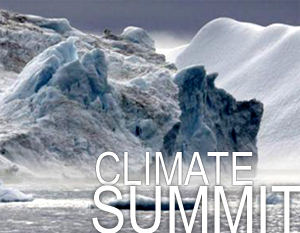Climate summit on verge of collapse
 Copenhagen, Dec 17 - A day before it was scheduled to come up with an agreement to save the world, the climate summit was on the verge of collapse Thursday with rich countries refusing to promise that they would either cut their pollution any more or give poor nations any meaningful sum of money to cope with the effects of climate change.
Copenhagen, Dec 17 - A day before it was scheduled to come up with an agreement to save the world, the climate summit was on the verge of collapse Thursday with rich countries refusing to promise that they would either cut their pollution any more or give poor nations any meaningful sum of money to cope with the effects of climate change.
As the negotiations collapsed despite efforts through the night, India's Environment Minister Jairam Ramesh said: "If the talks do fail, it will be because developed countries have not fulfilled their legal commitments under the Kyoto Protocol (the current global treaty to tackle climate change)."
"India, China, Brazil and South Africa have worked very closely together to bring the negotiations. We cannot be blamed if there is a failure. It's the process managed by Denmark that has failed."
Ramesh pointed out that "one of the positive outcomes of Cophenhagen is the cementing of ties between India and China", a feeling reciprocated by China's delegation leader Su Wei, who told IANS: "Now there may not be anything out of Copenhagen except a weak political declaration."
Su responded strongly when asked about the European Union's criticism Wednesday that China - the world's largest emitter of greenhouse gases (GHG) since 2007 - was not doing enough. "We are doing much more than we have to," he said.
"These rich countries have filled the air with greenhouse gases, and now they tell us it is full, so we cannot emit any more. This is not fair."
The overnight talks broke down when host country Denmark insisted upon pushing its version of the Copenhagen agreement instead of the drafts that had been finalised by 192 countries after protracted negotiations, said an Indian official.
Brazilian delegation head Dilma Rousseff said there was "no way these talks can succeed when the rich countries want us to pay for the greenhouse gases they have put in the atmosphere".
Rousseff said industrialised countries had come with a last-minute proposal by which they would pay 55 percent of the money needed by poor countries to adapt to climate change effects, while emerging economies would have to pay 20 percent and the other developing countries the rest. "And on top of that, the developed country governments will not pay the money, they will look for private funds."
All emerging economies had rejected the idea promptly.
When Prime Minister Manmohan Singh arrives Thursday evening, "he will have little to do except attend a gala dinner, pose for group photos and put his signature on a weak statement that means nothing", said an Indian NGO representative. (IANS)